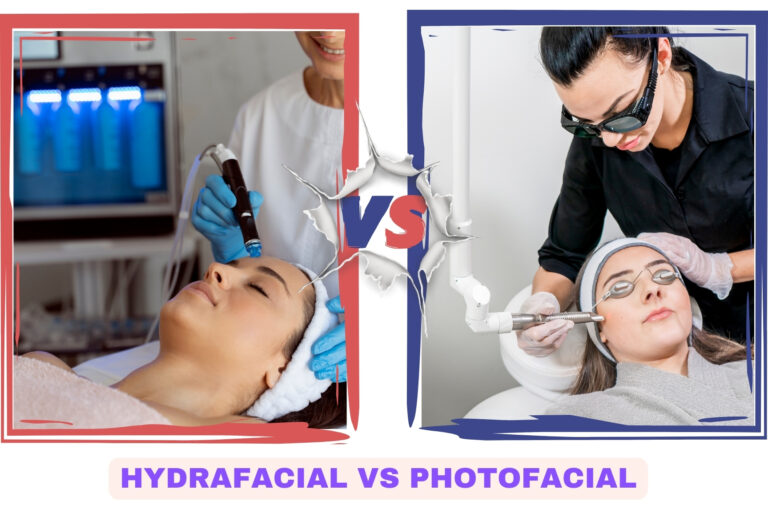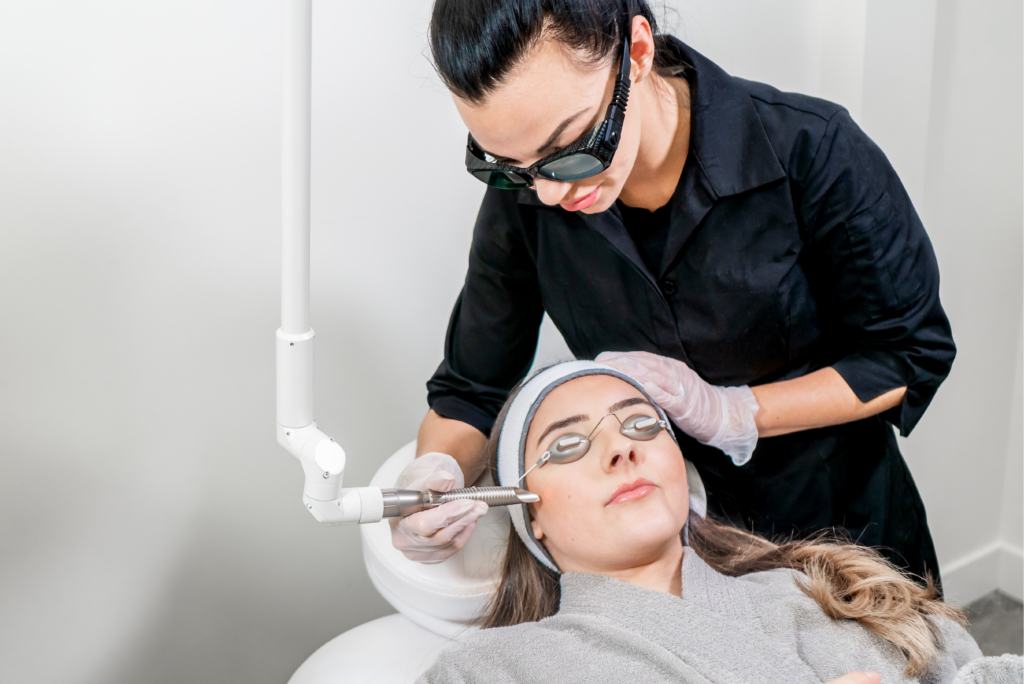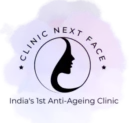
Table of Contents
ToggleHydrafacial Vs Photofacial
Flawless and glowing skin is a dream for everyone to look the best, even on their bad days. However, your skin keeps losing its natural glow as it gets more exposed to pollution and sun exposure. Plus, your skin also looks dull as you grow older. Facial is one of the best ways to rejuvenate your skin and retain the lost glow. Many people visit salons every month to boost their skin health, pamper themselves, and feel relaxed. Different facials treat different skin issues, such as acne, blemishes, hyperpigmentation, and aging signs. With the availability of various types of facials, you should choose the right option suited to your skin type, condition, and issues
Hydrafacial and Photofacial are the two most popular types of facial that people use to enhance their skin. Before considering any of these two options, you should know how they work and can benefit your skin. Here, you will learn how they work and are different from each other which would help you to go for the right facial. Let’s dive in.
How Does Hydrafacial Work?

Hydrafacial is a medi-facial treatment involving multisteps and is carried out with Hydrafacial MD, a proprietary tool. Aesthetician can use this device in a session to clean, exfoliate, extract, and inject various brightening serums. As Hydrafacial can instantly brighten and tighten skin, it is growing in demand among people who maintain healthy skin and want to have a brightening effect on their skin before attending a special event. Hydrafacial works like microdermabrasion use a mild abrasive tool to lightly sand skin and remove the uneven and thicker outer layer.
The exfoliating tip with suction removes dead cells from the skin surface. Once exfoliation is done, serums are infused into the skin. The entire process takes less than 30 minutes with no downtime. Hydrafacial involves the three steps below:
1. Clean and Peel
Cleaning and peeling is the initial step when the skin gets exfoliated. Exfoliation is the process of removing dead cells from your skin’s topmost layer. It has long-term effects on your skin, such as brightness, unclogged pores, and increased collagen production.
2. Extract and Hydrate
The exfoliating tip clears clogged pores and hydrates your skin with topical moisturizers.
3. Infuse and Guard Your Skin
The Hydrafacial treatment ends with serum and booster application on your skin that reduces the appearance of wrinkles, fine lines, hyperpigmentation, large pores, and dullness.
How Does Photofacial Work?

Photofacial treatment focuses a light beam on your skin surface to remove the pigments in the form of red and brown spots. Plus, this facial treatment heats the lower dermis layer to increase collagen production. Then, blood vessels and collagen contract, which gives you healthier and smoother skin and treats acne since the targeted light beam kills the acne-causing bacteria that cause skin inflammation. This treatment helps in treating brown or pink marks on your skin left after the acne gets treated.
Hydrafacial and Photofacial Comparison
The table below shows the comparison between Hydrafacial and Photofacial depending on different parameters:
Parameters | Hydrafacial | Photofacial |
Focus | Cleanses exfoliates, hydrates, and enhances the overall skin tone | Improves skin texture and reduces the appearance of acne, redness, pigmentation, and sun damage spots |
Targeted Skin Concerns | Fine lines, dullness, dryness, and congestion | Acne scars, rosacea, freckles, and age spots |
Number of Sessions | A single session usually works | Multiple sessions are required to get the desired results |
Suited skin types | Suits almost all skin types | Suits almost all skin types, but doctor consultation is recommended |
Ingredients and Technologies | Serums, suctions, and vortex technology | Intense Pulsed Light (IPL) |
Pain involved | Usually comfortable with no pain involved | May cause a little pain and tingling sensation |
Results | Instant glow, hydrated skin, and enhanced texture | Increased collagen production and slowly reduced appearance of redness and pigmentation |
Downtime | No to minimum downtime | Minimum downtime with mild swelling or redness |
Cost | Depends on the clinic location and the doctor’s expertise | Depends on the clinic location, the doctor’s expertise, and the number of sessions |
Customization | Can be customized and is flexible | Can be customized depending on your skin condition |
How Does CNF Help in Choosing a Custom Treatment As Per Your Skin Type?
Different types of skin have different concerns and issues that require aesthetic treatments, such as vampire facial and microneedling. Getting a vampire facial, the upgraded level of microneedling can be a great choice to reduce the appearance of wrinkles and fine lines. Microneedling can be a good treatment to improve your skin texture and appearance. Thus, you should consult our doctor at CNF in Bengaluru so we can check your skin and customize the treatment suited to your requirements. Our doctor can suggest which would suit you more among vampire facial and microneedling depending on your aesthetic goals. Sign up for a free consultation today.
Talk To Our Skin Expert Today!
No Obligations! Just jump on a quick call with our skin expert and know what kind of treatment will suit you the best.
Either way you will get some actionable tips to reach your skin goals faster.
Why Clinic Next Face?

Experienced in-house team of certified cosmetic doctors and a huge network of dermatologists, surgeons, nutritionists, PMU Artists, cosmetologists, and other medical professionals.

Free Hair & Skin Assessment by the experts in the industry.

Advanced FDA approved equipments along with well trained doctors.

Served 1,00,000 happy customers and counting

India's First Smart-Ageing Clinic which takes holistic approach to make reverse all signs of physical ageing.

We commit to provide customized treatments and setting right expectations before treatments.
Frequently Asked Questions On Hydrafacial Photofacial Treatment
Hydrafacial reduces the appearance of wrinkles and fine lines and gives you hydrated, plump, and glowing skin. Photofacial improves your skin’s appearance and texture, making it look more youthful, smoother, and brighter.
3 to 6 sessions of Hydrafacial at an interval of 4 to 6 weeks deliver good results. 3 to 6 sessions at intervals of 1,3,6, or 12 months can give the desired results depending on the skin concerns and aesthetic goals.
You can get Hydrafacial every 4 to 6 weeks to treat acne, wrinkles, uneven skin tone, and hyperpigmentation. Photofacial is recommended for getting 4 to 6 sessions at an interval of 4 weeks. Your skin gets time to heal in a month, which helps the treated skin cells to naturally flake off and reveal a brighter complexion.
Yes, you can do Hydrafacial after photo facial, as the potent antioxidants can be applied to your skin to accelerate the process of exfoliating dark spots and add nutrients and hydration to your dermis. Getting a photo facial after Hydrafacial can be good for getting smoother, glowing, and youthful skin. The combination treatment of Hydrafacial and Photofacial at an interval of approximately 2 weeks can do wonders for your skin.
Hydrafacial and Photofacial can address various skin concerns, such as acne, wrinkles, fine lines, hyperpigmentation, and uneven skin tone. The cleansing, exfoliation, and extraction clear and purify your skin and remove the triggers causing severe concerns.
Hydrafacial rejuvenates your skin and the results gradually fade away in 4 to 6 weeks. You should get it once every month to maintain the glow in your skin.
Photofacial enhances your skin but doesn’t deliver permanent results since it can never prevent aging. However, the results won’t stay forever. You should schedule follow-up sessions at an interval of 3 to 4 weeks to maintain the results.
You should get hydrafacial every 4 to 6 weeks to treat multiple skin concerns, such as wrinkles, fine lines, uneven tone, acne, and hyperpigmentation.
You can get 2 to 5 sessions of photofacial at an interval of 3 weeks depending on the area to be treated and your desired results.



